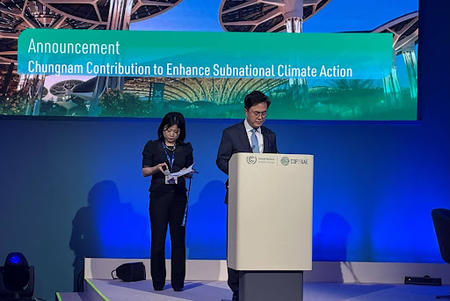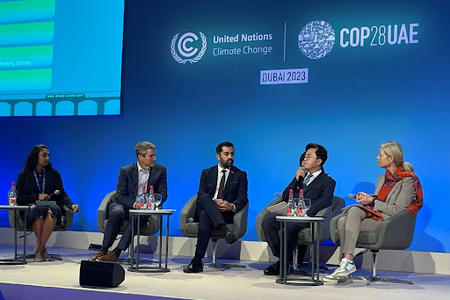Saturday was a full day of activities as part of the first ever Local Climate Action Summit at COP, facilitated by Bloomberg Philanthropies. The summit hosted over 450 attendees from more than 60 countries, including over 250 mayors and governors. Under2 Coalition governments from all regions were represented and able to use the opportunity to highlight their particular climate concerns as well as to share their stories of success.
The day began with a meeting to explore ways of strengthening global climate action through the COP process. Governors and Ministers highlighted the ability of states and regions to react to environmental issues on the ground, particularly ecological concerns, and their knowledge of local climate priorities. They also agreed that connections with national governments need to be scaled up to meet the challenges posed by the climate crisis. Basque Country also welcomed the inclusive nature of this year's COP activities, saying that "it is very important for regions to be part of international negotiations."

This was followed by a widespread discussion on how states and regions are driving climate action where they are.
Our CEO Helen Clarkson opened the session, saying that states and regions are using their powers to change policies and engage in international climate negotiations - and it's now time to translate this into action on the ground at COP and beyond.
Asia-Pacific co-chair of the Under2 Coalition, Chungnam Province, then set the tone for further discussions by becoming the Coalition's first member to announce funding support for a new Governors and Premiers Partnership. This Partnership aims to enhance high-level political leadership on climate change at the regional level, as well as increase the global impact of the Under2 Coalition. Funding support was also announced from Bloomberg Philanthropies and other regional governments will be invited to join in the coming weeks.

In a panel led by our Executive Director Champa Patel, co-chairs and leaders in the Under2 Coalition shared their experiences of taking action locally. Governor Kim spoke of the province's work in phasing out coal and advocating for others to follow their lead. Europe co-chair Humza Yousaf echoed this sentiment saying that "if you want things done, devolve the powers down to people taking action at local level". He also called for energy sector reform to enable faster transition to renewable energy.
Wade Crowfoot of California acknowledged progress in bringing subnational governments into international negotiations - starting with the Paris Agreement. However he said "this is an implementation crisis and the Global Stocktake is a wake up call". States and regions are on the frontlines of this crisis and need support to succeed in holding back climate impacts. Thekla Walker of Baden-Wurttemberg meanwhile said that subnational governments need to be held accountable for their targets to reach net zero, just like their national counterparts. She said states and regions are not a 'side act' but actors that must be counted as part of the COP process.

In the afternoon Ani Dasgupta, President and CEO of the World Resources Institute, opened a panel session marking a year since the start of the Subnational Climate Action Leaders' Exchange (SCALE). He was joined by other founding members of SCALE, including Helen Clarkson, with speakers reflecting on how the past year has increased collaboration across different groups. Rick Duke, Deputy Special Envoy for Climate in the United States, then announced the launch of the LOW-methane (Lowering Organic Waste) consortium. This initiative is aimed specifically at the waste sector, and aims to cut at least 1 million metric tons of annual waste sector methane reductions well before 2030 through the work of 40 subnational jurisdictions and to unlock over $10 billion in investment.

Finally, Catalonia and California launched a global partnership for the adaptation and mitigation of climate change - as well as the reversal of biodiversity loss - in regions with Mediterranean climates. 15 regions from five continents have joined the new Mediterranean Climate Action Partnership (MCAP): Baja California Sur (Mexico), Biobío (Chile), Emilia-Romagna (Italy), Eastern Morocco (Morocco), New South Wales (Australia), Occitania (France), Rabat-Salé-Kénitra (Morocco), Central Greece (Greece), Santiago (Chile), South Australia (Australia), Tangier-Tetouan-Al Hoceima (Morocco), Victoria (Australia) and the Western Cape (South Africa).






